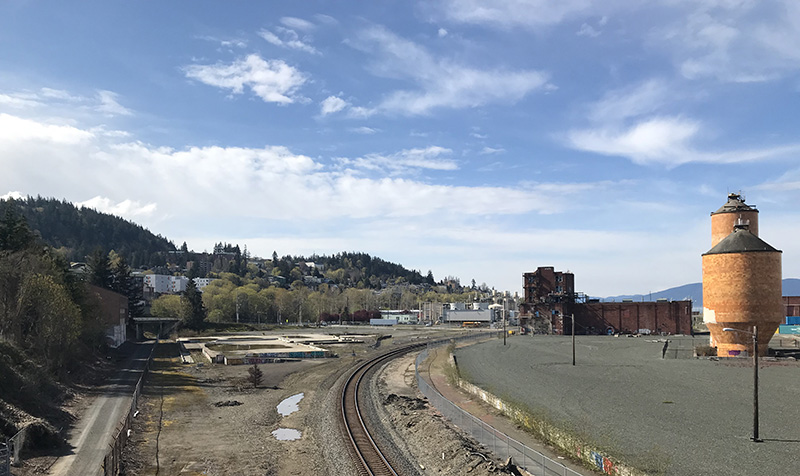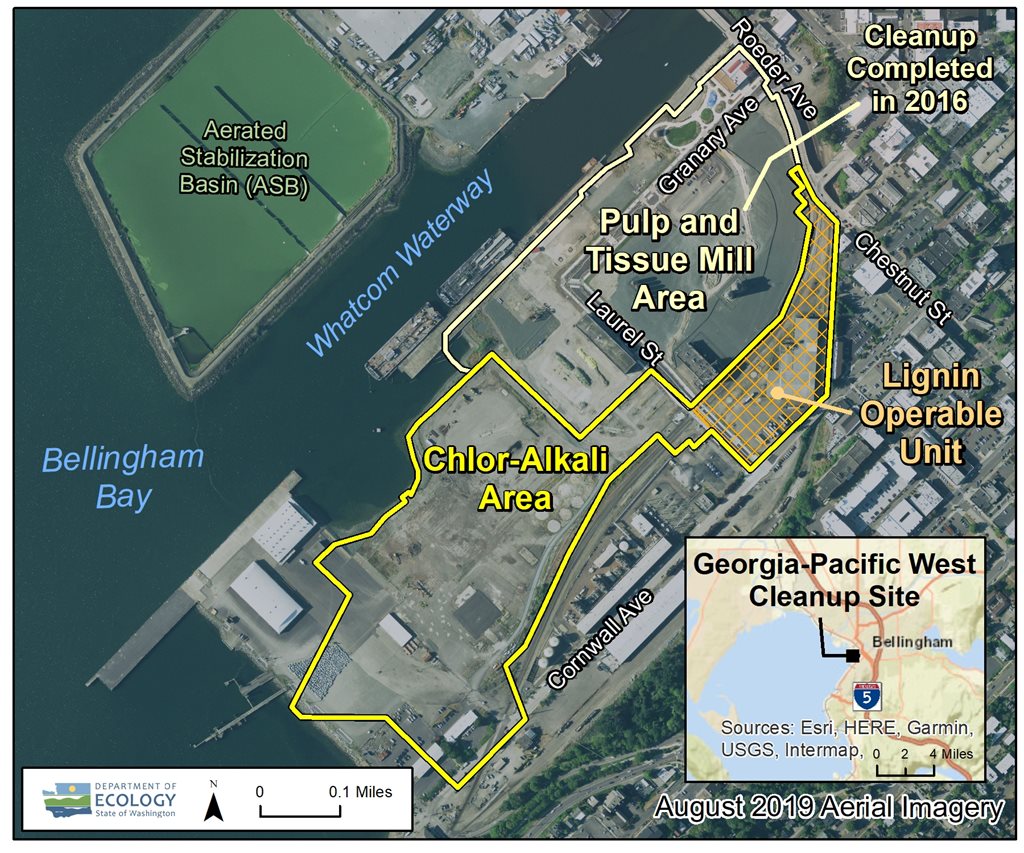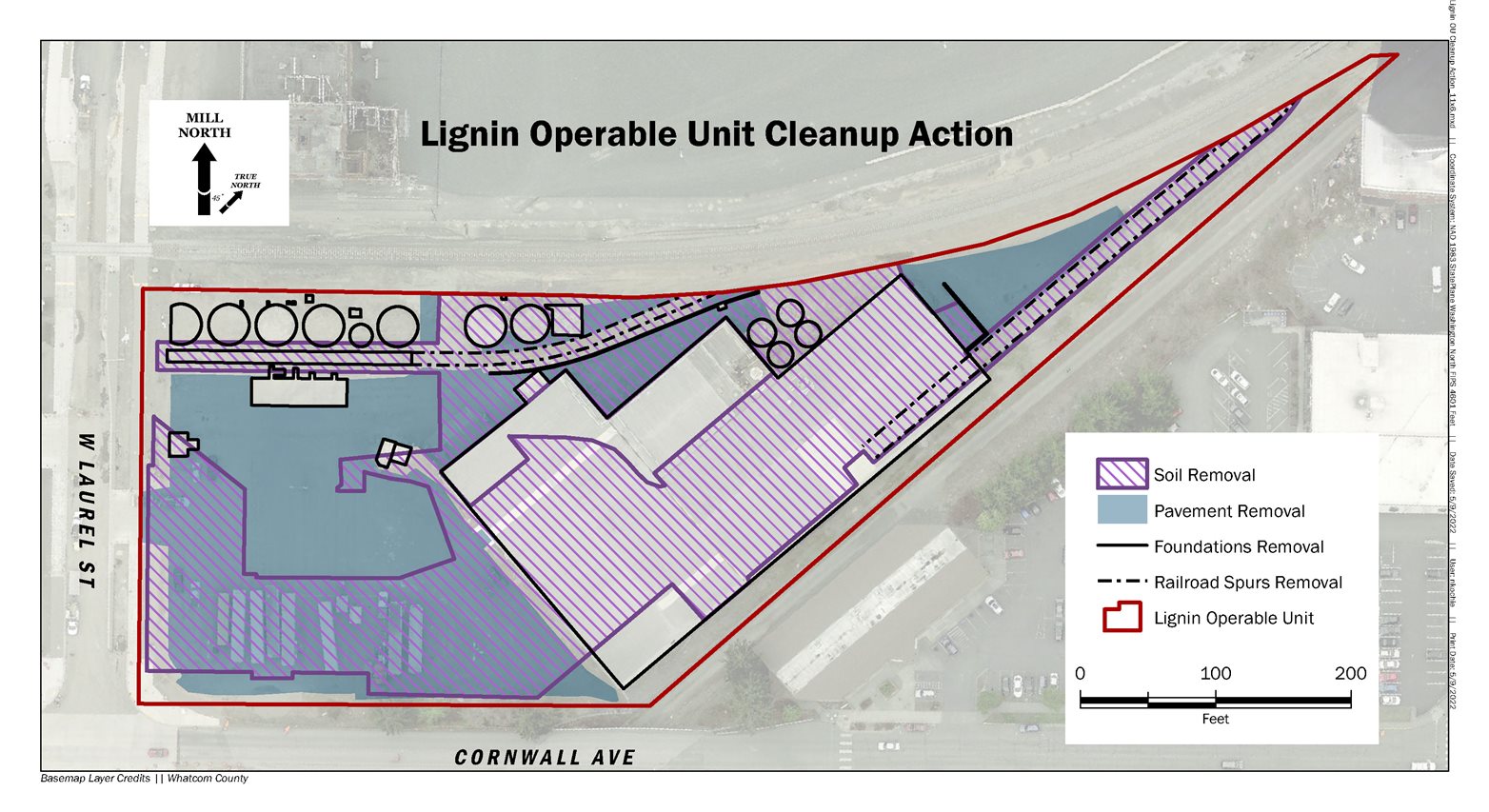
Lignin Operable Unit (left of railroad tracks), April 2022
Once contaminated by decades of use as storage for a paper mill byproduct called lignin, four acres of downtown Bellingham will soon be cleaned up and redeveloped into affordable housing, thanks to a partnership between us, the Port of Bellingham, and Mercy Housing Northwest.
The Port is proposing to clean up this area formerly used by Georgia-Pacific West, which we call the Lignin Operable Unit, by removing 13,600 tons of contaminated soil and 5,900 tons of other debris (such as pavement) this year. After the cleanup, Mercy will purchase a portion of the property. They’ll enter into a legal agreement with us to settle their cleanup liability, allow for continued environmental monitoring, and include affordable housing for at least 50 years. By the end of 2022, Mercy will begin redeveloping the property into affordable housing, community space, and an early learning center.
Ecology’s initiative to support planning, investigation, and cleanup of properties for use as affordable housing — which officially launched this year as our new Affordable Housing Grant Program — has provided funding to the Port during several project stages, including a $200,000 grant in 2019 to explore the feasibility of redeveloping the property into affordable housing, as well as a $2.8 million grant in 2021 for design and cleanup.
We’ve prepared several documents for this phase of the project, with a public comment period of June 20 – July 19, 2022. These documents are now available for review:
- Cleanup Action Plan: Ecology’s plan that describes the cleanup work to address contamination within the Lignin Operable Unit.
- Consent Decree Amendment: Amendment to a previous legal agreement between Ecology and the Port that requires the Port to complete engineering design documents and clean up the Lignin Operable Unit.
- Prospective Purchaser Consent Decree: Legal agreement between Ecology and Mercy that settles Mercy’s cleanup liability for the Lignin Operable Unit and details property access requirements and affordable housing development information.
Public meeting
You’re invited to a public meeting, where we’ll explain the contamination, past cleanup work, the cleanup plan we’re proposing, and how it will protect public health, safety, and the environment. The Port and Mercy will also be there to answer questions. The meeting will be held both online and in person, simultaneously.
Wednesday, June 29
- 6:30 – 7:30 p.m.: presentation
- 7:30 p.m.: question/answer time (as needed)
- In person: Ecology’s Bellingham office at 913 Squalicum Way, Unit 101 (follow signs toward back of Squalicum Lofts business park). All attendees are required to complete an online health screening before entering the building; staff will be available to assist you at the entrance. Face masks are optional.
- Online: Register and join the meeting.
- Call Ian Fawley, Outreach Specialist, 425-324-5901, for dial-in options and other meeting questions.
Online site tour
RE Sources will host a walking tour of the Lignin site. Staff from Ecology, the Port, and Mercy will be available to answer questions. To sign up for the walking tour or watch a virtual tour, visit RE Sources. The tour is funded through a Public Participation Grant from Ecology.
Wednesday, June 29, 2022
- Noon – 1:30 p.m.
- Meet at property access gate off of W. Laurel Street in downtown Bellingham.
- Parking is available across railroad tracks on other side of W. Laurel Street.
Cleanup Action Plan
Located at the corner of W. Laurel Street and Cornwall Avenue in downtown Bellingham, the Lignin Operating Unit is part of the Georgia-Pacific West cleanup site, a former pulp and tissue mill. The Lignin unit was carved out of a larger area to expedite redevelopment. A previous plan for this area proposed capping contaminated soil; this new draft Cleanup Action Plan proposes removing the soil and disposing it off-site. The plan also includes monitoring and site use restrictions to keep the property clean.
What happens next?
- June 20 – July 19, 2022: Public comment period for Lignin Operable Unit draft Cleanup Action Plan and associated legal documents.
- June 29, 2022: In-person walking tour (noon) hosted by RE Sources through an Ecology Public Participation Grant. Online and in-person public meeting (6:30 p.m.) hosted by Ecology.
- Late Summer 2022: Ecology finalizes the Lignin Operable Unit Cleanup Action Plan and associated legal documents after addressing public comments received. Port completes engineering design and begins cleanup.
- By End of 2022: Port completes cleanup. Mercy purchases a portion of the property from the Port and begins redevelopment.
About the cleanup site
The Lignin Operable Unit portion of the Georgia-Pacific West cleanup site was the location of a warehouse and aboveground tanks. The warehouse was used to store manufactured lignin products and the tanks contained liquid waste from the lignin process. (Lignin is a resin byproduct of the paper pulping process and can be converted into various consumer products such as vanilla flavoring, adhesives, pharmaceuticals, dust retardants, etc.) The warehouse and tanks are gone but foundations, pavement, and railroad spurs are still present on the property.
Environmental investigations at the Lignin Operable Unit have found metals and polycyclic aromatic hydrocarbons (PAHs) in the soil and metals in the groundwater.
About Ecology’s Affordable Housing Grant Program
Cleaning up contaminated sites is an expensive and time-consuming process. Many of these sites are located in overburdened communities (neighborhoods that are disproportionately at risk from environmental hazards). Developers who purchase contaminated properties need to recoup their costs while minimizing their financial risks, and often end up choosing to build high-end projects that drive gentrification and displace residents.
Our Affordable Housing Grant Program recognizes that there are opportunities to meet a community’s needs for both environmental cleanup and affordable housing. We provide two types of grants. Planning grants help a local government or private entity understand if a site is suitable for affordable housing, while cleanup grants help pay for the remediation work. In return, developers clean contaminated sites and guarantee certain numbers of affordable housing units for at least 30 years.
So far we’ve invested over $6 million to support the planning, investigation, and cleanup of several properties for use as affordable housing. Our first project, the Mount Baker Housing Authority’s Gateway development, has started construction. It will be a residential complex with about 200 affordable housing units in Seattle’s Mt. Baker neighborhood, next to the Mt. Baker Link station. This development highlights the exciting potential for turning contaminated properties into affordable transit-oriented housing, while reducing environmental and health inequities in our communities.



